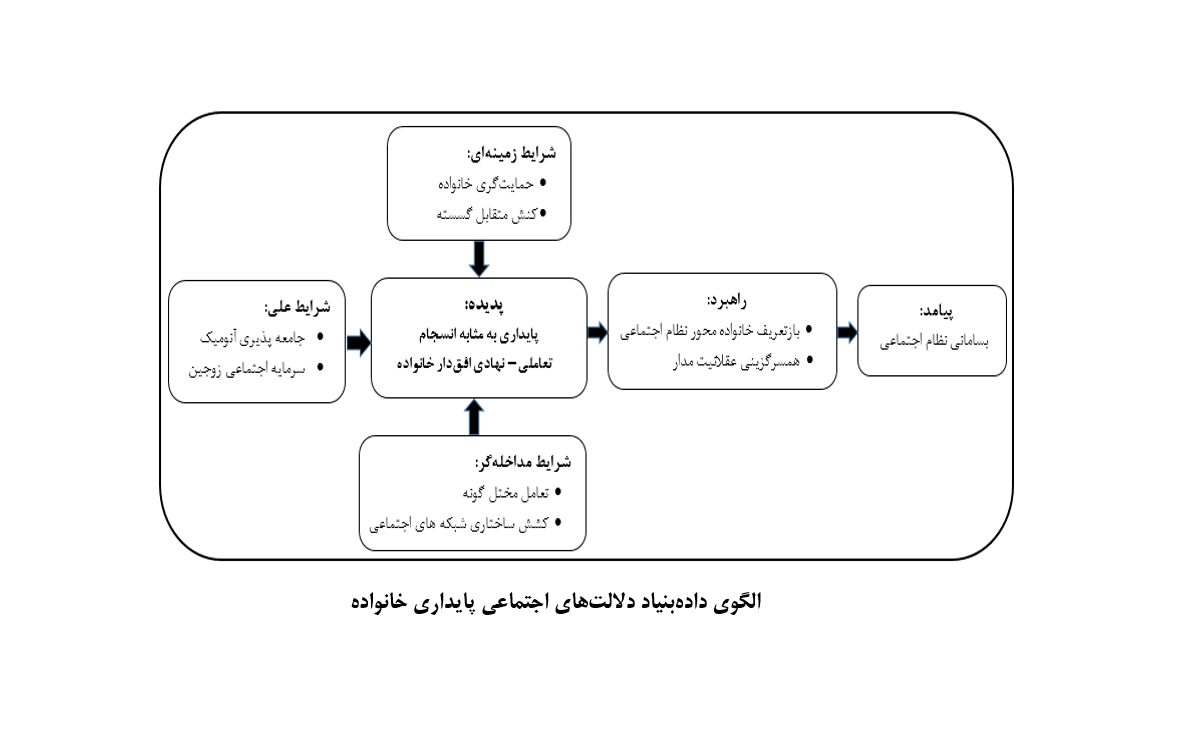واکاوی دلالتهای اجتماعی پایداری خانواده (مطالعه موردی: شهر اصفهان)
کلمات کلیدی:
پایداری خانواده, دلالتهای اجتماعی, انسجام تعاملی-نهادی, همپیوندی فردی-اجتماعی, نظریه زمینهایچکیده
این پژوهش با هدف شناسایی و تبیین دلالتهای اجتماعی پایداری خانواده در بستر اجتماعی و فرهنگی شهر اصفهان و ارائه الگویی دادهبنیاد از این پدیده انجام شد. این مطالعه با رویکرد کیفی و روش نظریه زمینهای سیستماتیک صورت گرفت. میدان پژوهش شهر اصفهان بود و مشارکتکنندگان چهارده نفر از متخصصان و کارشناسان حوزه خانواده بودند که بهصورت هدفمند ـ نظری انتخاب شدند. دادهها از طریق مصاحبههای عمیق نیمهساختاریافته گردآوری شد. فرایند تحلیل شامل کدگذاری باز، محوری و گزینشی بود و برای مدیریت و تحلیل دادهها از نرمافزار MAXQDA استفاده شد. اعتبار یافتهها از طریق بازبینی اعضا و ارزیابی متخصصان بیرونی تأیید شد. تحلیل دادهها نشان داد پایداری خانواده در بستر مطالعهشده پدیدهای چندبعدی است که با عنوان «پایداری خانواده بهمثابه همپیوندی فردی– اجتماعی افقمند» تعریف شد. شرایط علی شامل جامعهپذیری آنومیک و سرمایه اجتماعی زوجین، شرایط زمینهای شامل حمایتگری خانواده و کنش متقابل گسسته، و شرایط مداخلهگر شامل تعامل مختلگونه و کشش ساختاری شبکههای اجتماعی بودند. راهبردهای کلیدی برای تقویت پایداری خانواده شامل بازتعریف خانوادهمحور نظام اجتماعی و همسرگزینی عقلانیتمدار شناسایی شد. پیامد نهایی این فرایند «بسامانی نظام اجتماعی» از طریق ارتقای انسجام، امنیت و آرامش اجتماعی است. نتایج نشان میدهد پایداری خانواده صرفاً به عوامل فردی یا درونی محدود نمیشود و در تعامل پیچیده با ساختارهای اجتماعی، فرهنگی و ارتباطی شکل میگیرد. برای تقویت این پدیده باید همزمان بر ارتقای سرمایه اجتماعی زوجین، بازطراحی سیاستهای اجتماعی خانوادهمحور و مدیریت اثرات شبکههای اجتماعی تمرکز شود تا در نهایت انسجام و سلامت نظام اجتماعی پایدار گردد.
دانلودها
مراجع
Koenig HG, VanderWeele TJ, Peteet JR. Marital and Family Stability. 2024:254-80. doi: 10.1093/oso/9780190088859.003.0014.
Heidari H, Jahani Dolatabad E, Chitsaz MJ, Gholich M. Family Stability and Strength and the Factors Affecting It: Secondary Analysis of National Family Survey Data. Family and Research Quarterly. 2024;21(65):23-44.
Abbasi R, Pourjabali R, Zolfaghar K. Sociological Analysis and Interpretation of Factors and Barriers to Strengthening the Family Foundation (From the Perspective of Experts and Clients of the Zanjan City Family Court). Scientific-Research Quarterly of Applied Family Therapy. 2022;3(1):402-25. doi: 10.61838/kman.aftj.3.1.20.
Baghi M, Abbasi-Shavazi MJ. Household Dynamics in Iran: A Study of Four Decades of Changes in Family and Household Structure. Iranian Demography Association Journal. 2020;15(30):203-30.
Afsharkohan J, Rezaeian M. Intergenerational Comparison of the Relationship between Value System and Attitude towards Family Stability. Sociology of Social Institutions. 2018;5(12):293-326.
Emami P, Hashemianfar SA, Haghighatian M. Explaining the Relationship between Modernity and Familism in Isfahan City. Sociology of Social Institutions. 2018;5(11):227-51.
Kazemipour S. Family Transformations in Contemporary Iran with an Emphasis on Marriage and Divorce. Scientific Quarterly of "Research on Deviations and Social Issues". 2022;4:95-126.
Chitsaz MJ. The Iranian Family and Socio-Cultural Transformations: A Generational Analysis. Bi-quarterly Journal of Iranian Social Issues. 2023;14(1):89-112. doi: 10.61186/jspi.14.1.89.
Rasouli E. Youth's Attitude Towards White Marriage (Ezdevaj-e Sefid). Afaq-e Olum-e Ensani Monthly. 2021;5(15):51-70.
Yazdani F, Shafieabadi A, Heidari H. Predicting Marital Stability Based on Mate Selection Criteria, Communication Skills, and Family Resilience. Journal of Islamic Studies in the Field of Health. 2020;4(1):69-78.
Wang X, Li Q, Chen Z, Fang X. Stress Perception and Marital Instability Across the Family Life Cycle: An Actor‐Partner Perspective. Family Process. 2025;64(1). doi: 10.1111/famp.70018.
Akanle O, Nwaobiala UR. Changing but Fragile: Female Breadwinning and Family Stability in Nigeria. Journal of Asian and African Studies. 2019;55(3):398-411. doi: 10.1177/0021909619880283.
Khadivi S, Noughani M, Mazloum Khorasani M. Women's Employment and Family Stability: Presenting a New Approach to Conflicts in Previous Research. Women's Research Journal, Institute for Humanities and Cultural Studies. 2022;13(3):45-73.
Mehrabi M. Explaining the Role of Gender Inequality in Family Stability (Case Study: Women in Bandar Abbas City). Scientific-Research Quarterly of Islamic Lifestyle. 2023;7(2):76-84.
Pourjabali R, Azimi L, Ahmadpour Parvizian J. Studying the Relationship between Development Idealism and Changes in Family Structure (Case Study: Tabriz City). Scientific-Cultural-Educational Journal of Women and Family. 2022;17(60):251-73.
Yoo J. Gender role attitude, communication quality, and marital satisfaction among Korean adults. Journal of Family Studies. 2020;28(3):1-18. doi: 10.1080/13229400.2020.1791230.
Hasheminejad S, Eyvazi MR, Hājīāni E, Goljāni Amīzekhīz I. Future Scenarios of the Family in Iran. Quarterly Journal of the Women and Family Social Cultural Council. 2018;21(81):47-82.
Hashemizadeh Fs, Atashpour H, Farhadi H. Comparison of the Effectiveness of Paradox TimeTable Cure and Acceptance and Commitment Therapy Matrix on Family Adaptability and Mental Well-Being in Women with Marital Conflicts. Shenakht. 2025;11(6):106. doi: 10.32598/shenakht.11.6.106.
Maarefvand A, Shafiabady A. Effectiveness of Shafie-Abadi's Multidimensional Model Training on Enhancing Occupational Well-being and Quality of Work Life among Teachers in Qom City. International Journal of Education and Cognitive Sciences. 2024;4(4):21-30. doi: 10.61838/kman.ijecs.4.4.3.
Dehdast K, Ghobadi S. Explaining the Indicators of Disruption in the Iranian Family Affected by the Modernization Process: A Qualitative Meta-Analysis. Quarterly Journal of Counseling Culture and Psychotherapy. 2020;11(43):121-58.
Mahmoudzadeh A, Yousefi Z, Golparvar M. Designing a Family Stability Model Based on Islamic Teachings. Islamic Research Journal on Women and Family. 2019;7(17):33-74.
Youri Z, Yaghouti E. Principles Governing Family Health and Stability from the Perspective of Jurisprudence and Positive Law. Quarterly Journal of Legal Studies. 2024(17):19-38.

دانلود
چاپ شده
ارسال
بازنگری
پذیرش
شماره
نوع مقاله
مجوز
حق نشر 2025 Elahe Parvaresh, Seyed Naser Hejazi, Mansour Haghighatian (Author)

این پروژه تحت مجوز بین المللی Creative Commons Attribution-NonCommercial 4.0 می باشد.










